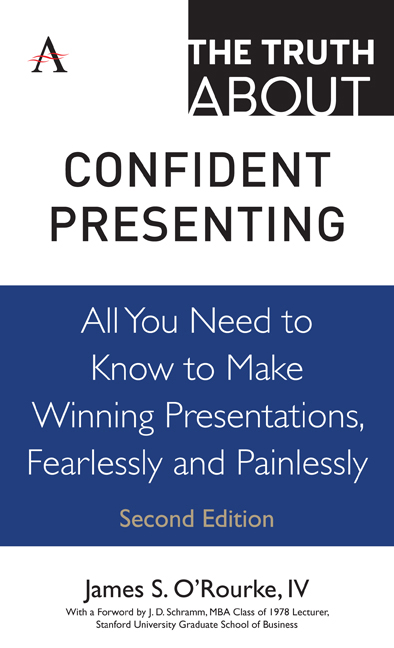 The Truth about Confident Presenting
The Truth about Confident Presenting Book contents
- Frontmatter
- Contents
- Foreword
- Introduction
- Part I Some Initial Truths
- Part II The Truth About Getting Ready to Speak
- Part III The Truth About What Makes People Listen
- Truth 13 Understand what makes people listen
- Truth 14 Your speaking style makes a difference
- Truth 15 Anticipate the questions your audience brings to your presentation
- Truth 16 Listening matters
- Truth 17 Being an active listener brings real benefits
- Truth 18 You can overcome the barriers to successful communication
- Part IV The Truth About Developing Support for Your Presentation
- Part V The Truth About Getting Up to Speak
- Part VI The Truth About Managing Anxiety
- Part VII The Truth About Nonverbal Communication
- Part VIII The Truth About Visual Aids
- Part IX The Truth About Handling an Audience
- Part X The Truth About What Makes a Presentation Work
- References
- Acknowledgments
- About the Author
Truth 17 - Being an active listener brings real benefits
from Part III - The Truth About What Makes People Listen
- Frontmatter
- Contents
- Foreword
- Introduction
- Part I Some Initial Truths
- Part II The Truth About Getting Ready to Speak
- Part III The Truth About What Makes People Listen
- Truth 13 Understand what makes people listen
- Truth 14 Your speaking style makes a difference
- Truth 15 Anticipate the questions your audience brings to your presentation
- Truth 16 Listening matters
- Truth 17 Being an active listener brings real benefits
- Truth 18 You can overcome the barriers to successful communication
- Part IV The Truth About Developing Support for Your Presentation
- Part V The Truth About Getting Up to Speak
- Part VI The Truth About Managing Anxiety
- Part VII The Truth About Nonverbal Communication
- Part VIII The Truth About Visual Aids
- Part IX The Truth About Handling an Audience
- Part X The Truth About What Makes a Presentation Work
- References
- Acknowledgments
- About the Author
Summary
Being an active listener can enhance your life in numerous ways. Both academic and business-related research show that good listening skills provide various benefits, including increased knowledge, job success, improved personal relationships and self-protection, among others.
Studies of human behavior have shown a steady tendency during the last sixty years in the United States toward more passive learning techniques and more passive leisure activities. As a society, Americans spend more time watching television, movies and videos, and less time reading. Coincidentally, we also spend more time these days listening to streaming music, podcasts and online audio.
A study conducted by UNISYS Corporation reported that students spend 60 to 70 percent of their time in a classroom listening. Professors Ralph Nichols and Leonard Stevens found in their studies at the University of Minnesota that every group of students receiving instruction in listening improved by as much as 40 percent. Without some instruction in listening improvement, however, it appears that the listening abilities of most people actually decline from elementary school on.
In addition to these findings, a number of other good reasons exist for you to improve your listening skills.
Listening demonstrates acceptance. The very act of listening to another person demonstrates that you value him or her and care about what he or she is saying. If you show that you don't care about others, they'll quit talking to you. Good, perhaps, in the short run, but disastrous in the long term.
Listening promotes problem-solving abilities. Leaders, parents and managers are often asked to do what bartenders, cab drivers and counselors have done for years: give someone the time (and attention) to talk through a problem. Rather than providing advice and solutions 17 right away, most successful managers encourage employees to arrive at solutions on their own. By listening carefully and reflectively, you can guide someone else to a solution that has a greater chance for success and substantially greater levels of acceptance than if you provided the answer.
Listening increases the speaker's receptiveness to the thoughts and ideas of others. The best ideas don't always come from yourself or your immediate staff and colleagues. Often, you'll find great ideas where you least expect them. They may come from your customers, your employees, your suppliers and business partners, and (interestingly) from people who refuse to do business with you.
- Type
- Chapter
- Information
- The Truth about Confident PresentingAll You Need To Know To Make Winning Presentations, Fearlessly And Painlessly, pp. 65 - 68Publisher: Anthem PressPrint publication year: 2019


